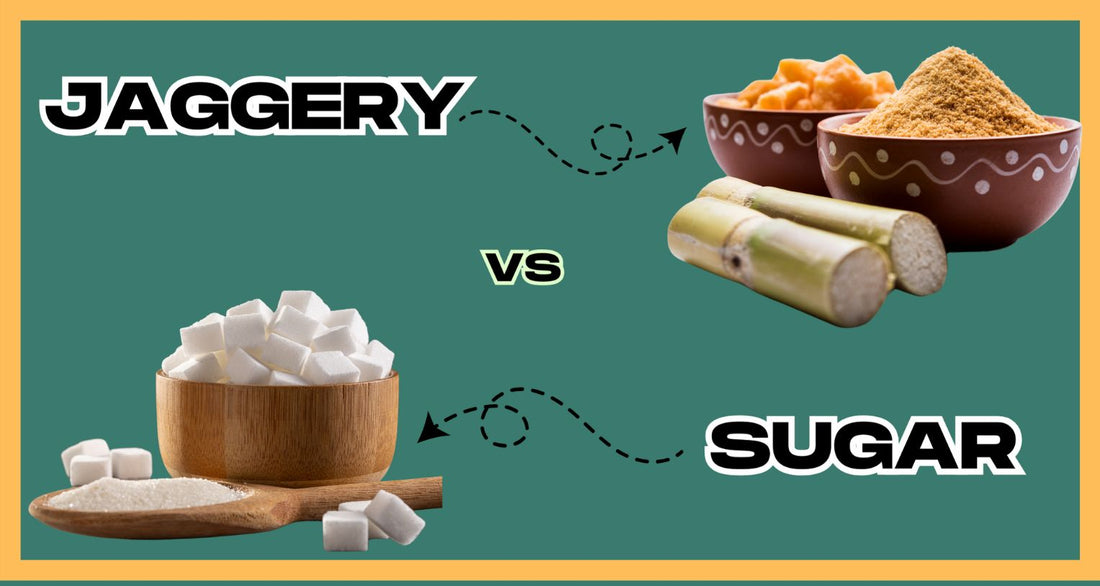
Jaggery vs. Refined Sugar: The Sweet Truth You Need to Know
SHAILENDRA YADAVShare
Is Your Sweet Tooth Leading You in the Wrong Direction?
We all love a little sweetness in life, but did you know that the kind of sugar you consume can make a world of difference to your health? If you've been reaching for refined white sugar without thinking twice, it’s time to reconsider. Enter jaggery—the natural, unrefined alternative that has been used for centuries. Packed with essential minerals, antioxidants, and a lower processing footprint, jaggery is a far better choice for your body. Let’s dive deep into why switching to jaggery can be one of the healthiest decisions you make.
What Makes Jaggery Better Than Refined Sugar?
Refined sugar is stripped of all nutrients during processing, leaving behind nothing but empty calories. Jaggery, on the other hand, retains trace minerals like iron, magnesium, potassium, and calcium. This makes it a more nourishing option compared to its processed counterpart.
Nutrient Comparison: Jaggery vs. Sugar
| Nutrient | Jaggery | Refined Sugar |
|---|---|---|
| Iron | High (Prevents anaemia) | None |
| Magnesium | Present (Supports heart health) | None |
| Potassium | Present (Balances electrolytes) | None |
| Antioxidants | Rich (Fights oxidative stress) | None |
The Process: How Jaggery is Made
To truly understand the difference between jaggery and refined sugar, we need to explore how jaggery is made. Jaggery is produced by boiling raw sugarcane juice or palm sap until it thickens into a golden-brown paste. This mixture is then cooled and solidified into blocks or powder. Unlike refined sugar, which undergoes heavy processing with chemicals like sulfur dioxide and phosphoric acid, jaggery is made naturally, preserving its nutrients and health benefits.
How Jaggery Affects Blood Sugar Levels
Both jaggery and sugar contribute to blood glucose levels, but jaggery is absorbed slightly slower due to its complex composition. This results in fewer sudden spikes, helping maintain steadier energy levels throughout the day. If you’re pairing jaggery with foods high in protein and healthy fats—like peanut butter—it can further help slow down sugar absorption and provide long-lasting energy.
The Role of Jaggery in Digestion & Detoxification
Jaggery is known to aid digestion by stimulating digestive enzymes and reducing bloating. It also helps detoxify the liver by flushing out harmful toxins, something refined sugar cannot do. A simple post-meal trick is to consume a small amount of jaggery, which can promote better digestion. Spreading some peanut butter sweetened with jaggery on whole grain toast can be a great way to support gut health while enjoying a naturally sweet treat.
Jaggery and Energy Levels: A Smarter Sweetness for an Active Lifestyle
Unlike refined sugar, which leads to quick energy crashes, jaggery provides a slow and steady release of energy. This makes it an excellent choice for pre-workout snacks. Spreading a spoonful of dark chocolate peanut butter made with jaggery on a banana or mixing it into a smoothie can give you a natural energy boost without the crash.
How to Make the Switch to Jaggery
- Use jaggery powder in your morning tea or coffee instead of white sugar.
- Bake with jaggery instead of refined sugar for a nutrient boost.
- Mix jaggery with warm water or milk to enhance digestion.
- Pair jaggery-based spreads with whole-grain snacks for a balanced energy source.
Final Verdict: Choose Smarter Sweetness
If you’re looking for a healthier, more natural way to satisfy your sweet cravings, jaggery is the way to go. With its rich mineral content and health-supporting properties, it’s time to ditch refined sugar and embrace the natural sweetness of jaggery. Whether you enjoy it in your meals, drinks, or even your favourite peanut butter, making the switch is easier than you think.







